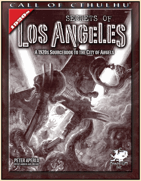
|
About OgreCave and its staff
|

|
by Steve Kani
Secrets of Los Angeles is part of a series of city sourcebooks for Call of Cthulhu set in the 1920's. Like the other books in this series, Secrets of Los Angeles is meant to give the Keeper enough information about the major people, places and events of the area and era. The City of Angels - with it's rich history, diverse culture, and it's ties to the world of show business - makes an ideal backdrop for many an adventure.
Production Value
Organization The next three chapters contain information on the various regions of Los Angeles. Each chapter has a street map of the location and descriptions of key locations and people. It's a lot of stuff, and finding a specific location on the fly is difficult at best. It took me fifteen minutes to find UCLA, and I knew where to look. The fifth chapter covers various outlying areas within easy driving distance of Los Angeles. The sixth chapter gives an overview of the film industry including terminology, technology and scandals.
Beneath the Glitz and Glamour Los Angeles has a diverse culture and colorful history. Each chapter is full of locations and landmarks, colorful characters both real and fictional, and enough history to bring Tinseltown to life in any campaign. Ultimately, everything comes back to show business and the movie industry - a wonderfully rich subject on which to base any number of Call of Cthulhu games. Thoughtfully included are numerous scandalous people and events to stimulate the imagination. In addition, a number of Mythos themes have been inserted into the rich pastiche of the city. (Beware of a few spoilers in the following paragraph) From Tcho-tchos serving human meat in a restaurant in Chinatown, to a Yithian city under Signal Hill, several amusing seeds are presented as springboards for adventure. The Tsathoggua worshipping Indian tribe in the San Gabriel Mountains may possibly be viewed as slightly offensive by some - particularly those of Native American descent. Many of the Mythos related items seemed a bit haphazard to me. Deep ones living in the waters of the coast of California made some sense to me, as the island of Ponape was alleged to have been discovered in the western Pacific. The seventeen foot statue of Shub Niggurath buried in a lagoon near Malibu seemed a bit random. In nearly every Call of Cthulhu sourcebook, it seems there is one or more individuals of Chinese descent that know a little more about the Mythos than everyone else - and Secrets of Los Angeles is no exception! Not only does the book feature the obligatory elderly Chinese sage, but an evil sorcerer as well.
Conclusions In order to run a satisfactory adventure or campaign in the City of Angels, it's almost imperative that the Keeper be thoroughly familiar with Secrets of Los Angeles. While not perfect, the book makes a good effort and delivers a lot of solid information for the price.
|
||||
 Secrets of Los Angeles
Secrets of Los Angeles